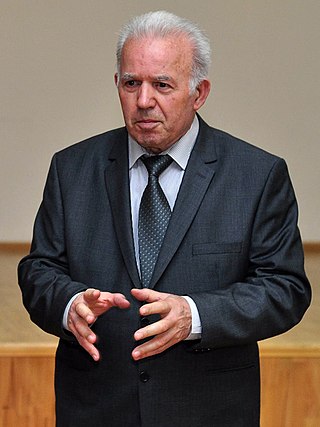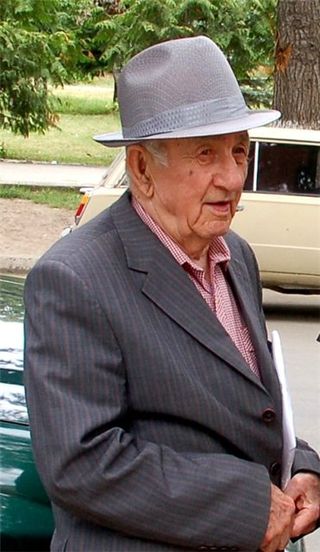
Eduard Dzhabeyevich Kokoyty is an Ossetian politician who served as President of the partially recognized state of South Ossetia from 2001 to 2011.

The Georgian–Ossetian conflict is an ethno-political conflict over Georgia's former autonomous region of South Ossetia, which evolved in 1989 and developed into a war. Despite a declared ceasefire and numerous peace efforts, the conflict remained unresolved. In August 2008, military tensions and clashes between Georgia and South Ossetian separatists erupted into the Russo-Georgian War. Since then, South Ossetia has been under Russian occupation.

Lyudvig Alekseyevich Chibirov was the Chairman of the Parliament and later, following inaugural elections the first President of South Ossetia. Born in 1932, Chibirov is a former member of the South Ossetian Parliament. Prior to the elections in 1996, he had been South Ossetia's head of state since 1993. When the post of Chairman of the Parliament was abolished in favor of the presidency, Chibirov became the first occupant of the new office.

Presidential elections were held in South Ossetia on November 12, 2006, coinciding with the South Ossetian independence referendum. Incumbent Eduard Kokoity was seeking a second full five-year term. He was re-elected with more than 98.1%. According to the de facto authorities, the election was monitored by a team of 34 international observers from Germany, Austria, Poland, Sweden and other countries at 78 polling stations. The Ukrainian delegation was led by Nataliya Vitrenko of the Progressive Socialist Party of Ukraine. The election process was criticised by local civic society and the results were likely to be inflated.

The Communist Party of South Ossetia is a communist party in South Ossetia. The party was founded in 1993. As of 2004, the party claimed a membership of 1,500. The party seeks recognition of the Republic of South Ossetia, which is considered by most countries as part of Georgia

The People of South Ossetia for Peace movement was the opposition party and political movement in South Ossetia which was formed by the ethnic Ossetians who had been formerly members of the secessionist government in Tskhinvali and outspoken critics of de facto separatist regime in Tskhinvali, headed at that time by Eduard Kokoity.

Parliamentary elections were held in South Ossetia on 31 May 2009. The result was a victory for the ruling Unity Party, which won seventeen of the 34 seats. Two opposition parties were not permitted to run out of concern that they might not be loyal to President Eduard Kokoity.

The Parliament of South Ossetia is the unicameral legislature of the partially recognized Republic of South Ossetia. The 34 members of parliament are elected using a mixed system of Party-list proportional representation (17) and single-member districts (17). South Ossetia has a multi-party system, and currently 5 political parties are represented in parliament and has 6 independent MPs elected through single-member districts. The parliament is headed by a speaker, who is elected from among the members. Since 15 september 2022 the speaker of parliament is Alan Alborov, one of the four deputees of the Nykhaz party of president Alan Gagloev, after Alan Tadtaev of United Ossetia was forced to resign.

Parliamentary elections were held in South Ossetia on 23 May 2004.
Gerasim "Rezo" Georgievich Khugayev is an Ossetian politician and former Prime Minister of the Republic of South Ossetia. He is the only South Ossetian Prime Minister to serve more than one time, at this date. He first served from October 1993 until May 1994 under Head of State Lyudvig Chibirov, and then again from December 2001 until August 2003, as the first Prime Minister appointed by President of South Ossetia Eduard Kokoity.

Znaur Nikolayevich Gassiyev was a South Ossetian politician, who was one of the leaders of the South Ossetian independence movement in the early 1990s, which culminated in the 1991–1992 South Ossetia War.

Stanislav Jakovlevich Kochiev is a South Ossetian politician, who is a former presidential candidate and former chairman (speaker) of the Parliament of South Ossetia.

South Ossetia elects on the national level a head of state—the President—and a legislature. The president is elected for a five-year term by the people. The Parliament of South Ossetia has 34 members, elected for a five-year term using party-list proportional representation.
Kosta Georgievich Dzugaev, is a South Ossetian politician, who is a former chairman (speaker) of the Parliament of South Ossetia.

Presidential elections were held in South Ossetia on 13 November 2011. A referendum was held on the same day. A run-off was held on 27 November, but the result were invalidated by the Supreme Court of South Ossetia. A new election was scheduled for 25 March 2012.

Presidential elections were held in South Ossetia on 25 March 2012, with a second round on 8 April. The election selected the first president since the country gained partial international recognition.

Presidential elections were held in South Ossetia on 10 November 1996. The result was a victory for the incumbent head of state Lyudvig Chibirov, who received 52% of the vote.

Presidential elections were held in South Ossetia on 9 April 2017 alongside a referendum on changing the official name of the state to "Republic of South Ossetia–the State of Alania", or "South Ossetia–Alania" for short. Incumbent President Leonid Tibilov ran for a second and final term in office, but was defeated by Anatoly Bibilov of the United Ossetia party.

Presidential elections were held in the disputed territory of South Ossetia on 10 April 2022. As none of the presidential nominees obtained at least 50% of the votes, a runoff was held on 8 May 2022, between the top two candidates, Alan Gagloyev and incumbent president Anatoly Bibilov.

Parliamentary elections were held in South Ossetia on 12 May 1999. They were the third elections in the then unrecognized state since its de facto independence following the First South Ossetia War and the first elections after the territory became a semi-presidential republic with a new constitution ratified on 27 November 1996. Prior to this, South Ossetia had no executive branch of government, and the Speaker of Parliament was the head of state.











